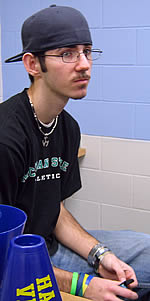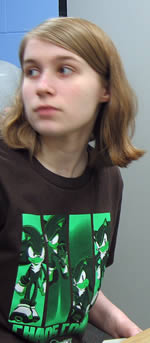 |
 |
|---|
HASLETT, MI—Between finding your way to your locker, passing your classes, and avoiding those intimidating upperclassmen, freshman year of high school is tough for almost everyone. Add special needs or disabilities to that equation and the difficulties can grow exponentially. But the special education students in the Freshman Focus program in Michigan’s Haslett High School not only receive added support during that transition—they also are taught to take an active role in designing their own Individualized Education Programs (IEPs), something that special needs students elsewhere in the country rarely do.
“Part of the conversation”
 In Freshman Focus, the students create PowerPoint presentations about their individual needs for their own IEP meetings “to explain ourselves,” says Steve, a Freshman Focus alum. “Doing your own IEP, it makes you feel in control. It’s a chance to compare your views with your teachers, on how you learn best and where you need help.”
In Freshman Focus, the students create PowerPoint presentations about their individual needs for their own IEP meetings “to explain ourselves,” says Steve, a Freshman Focus alum. “Doing your own IEP, it makes you feel in control. It’s a chance to compare your views with your teachers, on how you learn best and where you need help.”
Stacey Porritt, the resource teacher at Haslett who developed Freshman Focus, says that before high school, these students’ participation in their IEP meetings was generally very limited. Alexis, a sophomore, says that before joining the Freshman Focus program, “I never really understood what the IEP was about, except that it was a place for your parents and teachers to talk about you, but you didn’t know what was being discussed. And decisions were made for you. This way, you are part of the conversation; you can ask and answer your own questions.”
When Freshman Focus students recently spoke at a state meeting of special education teachers, one audience member asked, “Does being present at your own IEP make it harder or easier?” Alexis reportedly answered, “It isn’t really a question of easier or harder, it’s about being involved.”
Porritt’s students also pick an adult mentor in the school with whom they exchange monthly letters about themselves and their schoolwork. (The mentors could be anyone, from a custodian to the choir director.) Jared, one Freshman Focus student, asked his mentor for tips about improving his grades. “Mr. D.” responded: “I would suggest that you write down three or four specific things you can do in those classes that will help you improve your grade. If you don't have specific actions, you will not likely follow through. Some examples could be (1) study 30 minutes every night in those classes; 2) meet with my teachers at least twice per week for extra help; and (3) set up a review session with people in my class.”
Aside from such concrete advice, the mentoring program also provides students with the knowledge that there is an adult in school rooting for each of them.
Learning difference, not disability
“Many kids don’t really know what a learning disability is. They see the word disability and figure it means not capable, stupid.” —Lindsay “It’s taken me awhile to figure out my path. I’ve found out where I’ve been in life, but more, where I need to be.” —Nick |
The students in the Freshman Focus program also learn to view their own special needs in a new way. “We make a point of talking about it as a learning difference, not a learning disability,” says Porritt. “It has nothing to do with IQ, but everything to do with taking in information differently. We talk a lot about strengths and weaknesses, too. We talk about how boring it would be if we were all the same, if we all had the same strengths and weaknesses.”
During their time in Freshman Focus, many of the students come to terms with their own special needs. “Knowing you’re not the only one who has a learning disability really helps,” notes John, a Freshman Focus student. “There are celebrities and many people in the world that struggle with learning the way we do. People like Tom Cruise, who has severe dyslexia. He has to have someone read him his lines and then he memorizes them.”
This year, Porritt put up a “brag board” in the classroom and encouraged students to jot down accomplishments and post them on the board. When she presented the idea to the students, she says she was prepared for them to reject it as silly. But slowly, students started to fill the wall with their “braggables”:
“I finished my assignment in computer tech—which I never do. It’s a hard class.”
“I’ve been with my girlfriend for a month and two weeks.”
“My hockey team, we recently went to Pittsburgh.”
“I finally got a good grade on a worksheet in physical science.”
Asking for help—and getting it
 In learning not to be ashamed of their special needs, the students are also empowered to take control of the course of their own education. Freshman Focus students are encouraged to articulate their needs to their mainstream classroom teachers. Kristina, a sophomore, says that the program “taught me how to go up to my teachers and tell them that I was having difficulty, like with understanding something I was reading.”
In learning not to be ashamed of their special needs, the students are also empowered to take control of the course of their own education. Freshman Focus students are encouraged to articulate their needs to their mainstream classroom teachers. Kristina, a sophomore, says that the program “taught me how to go up to my teachers and tell them that I was having difficulty, like with understanding something I was reading.”
Cole, another of Porritt’s students, says that he now feels comfortable asking his teachers to “proofread my final draft so that I can then make it better still, run it on spell check and other things.” Cole says that in the Freshman Focus program, the students also “make PowerPoints for our teachers, where we talk about the ways we learn best, what’s hard for us, what would help us, all that good kind of stuff—and then what resources do we need, do we get, like a longer test time or a quiet room.”
A “safe place”
As part of a demographic that elsewhere in America has become quite marginalized and isolated, the special education students in Freshman Focus learn to speak up for themselves, make demands, and participate actively in their own community. They also are provided with the academic advice and support they need to succeed in their classes.
But perhaps most importantly, they gain an academic setting within the school where they feel included and accepted. “For the longest time, I thought that I’d get over this [disability]. I thought, not everyone is ‘normal’ or ‘smart,’ it’s not that big a deal. It will fade away soon,” she says. “When I was in freshman year, I looked at [Freshman Focus] and I said ‘I’m not taking that class. I’m not stupid.’ Then I realized how important it was to be with other students who shared your difficulties, who didn’t look at you funny. It became a safe place.”




